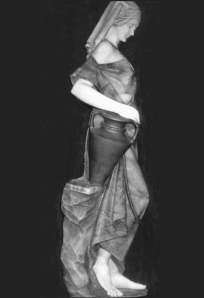A dramatic monologue in poetry is not exactly the same type of speech as a soliloquy in the theatre. In a soliloquy the character is alone on stage speaking his thoughts  aloud. There is no auditor other than the audience who is eavesdropping on those thoughts; although in a poetic dramatic monologue, the speaker could be alone talking aloud to himself, too.
aloud. There is no auditor other than the audience who is eavesdropping on those thoughts; although in a poetic dramatic monologue, the speaker could be alone talking aloud to himself, too.
Often the dramatic monologue is termed a persona poem, because the voice, the “I” of the poem, is a person speaking. In the process, the speaker reveals his personality traits and situation. Often his words are directed to an implied auditor. Other times the auditor is identified by use of direct address. The dramatic monologue could be described as a one-way conversation.
The soliloquy in theatre and the dramatic monologue in poetry share in common the dramatization of character. The dramatic monologue works to communicate peculiarities of speech, distinctive traits; and details about the time, place and other circumstances of the character’s life. Inherently, the dramatic monologue is fully realized in its theatrical performance. Some of the most memorable poems in English literature are dramatic monologues. In high school, Robert Browning’s classic poem in this form—“My Last Duchess”—fired my passion for poetry. In Browning’s poem there is an implied auditor to the Duke’s remarks. In another unforgettable example, T.S. Eliot’s “The Love Song of J. Alfred Prufrock,” identity of the “you” that Prufrock addresses in the opening lines is open to speculation. The dramatic nature of these poems endows them with a story-telling power not comparable in lyrical poetry. Robert Frost expanded the dramatic poem to a two-way conversation in such poems as “Death of the Hired Man” and “Home Burial.”
Before writing the collection Women at the Well, I had dabbled in persona poems, chiefly because the dramatic aspect made them ideal for oral interpretation in a Readers’ Theatre setting. The centerpiece of the collection is the woman whom Jesus meets at the well. She gives him water and he probes her soul. After hearing a church homily on John 4:1-28, I went home to write the poem “Woman at the Well.” That poem got me thinking about other nameless women in the Bible whose back stories begged to be told. Even the big name players like Deborah and Judith needed an expanded voice. In rereading the women’s stories, I discovered there was so much left unsaid in the male version that the gaping holes had to be filled. And the women’s stories must be told in their own words as imaginatively as I could.
I appointed myself to do this task in 1986. When I started the project, I was aware that revisionist looks at the Bible were appearing more in both fiction and non-fiction. As the poems progressed, I saw my Old Testament women filled with rage while the New Testament women reflected Christ’s message of love. The New Testament women were frequently the first Christian converts, so that in Part Two of the Women at the Well, the speeches become less strident. Since then my dramatic monologues have gone through two revisions and expansions. In its latest edition Women at the Well now includes the voices of sixty-one Old and New Testament women.
I confess to taking many liberties; I offer unorthodox interpretations of some of the Biblical women’s lives. I even went so far as to include a dramatic monologue by a woman who is never mentioned in the Bible: Judas’ mother. I wondered what the mother would say about her son’s betrayal of Jesus. In some poems, it is clear whom the woman addresses; in others her auditor is unidentified. In the paired piece, “Lot’s Daughters,” I have the two sisters alternate in a two-way conversation. The dramatic monologue in all its manifestations proved ideal for having the Biblical women come alive on the stage. In retrospect, I had probably the most fun writing this book than any other.
Writers usually turn to writing the types of writing that they enjoy. Naturally, I turned to dramatic monologue in Women at the Well, having read so much memorable poetry written in this form.
Can you recommend some dramatic monologues in poetry? Have you used the form in your own poetry?